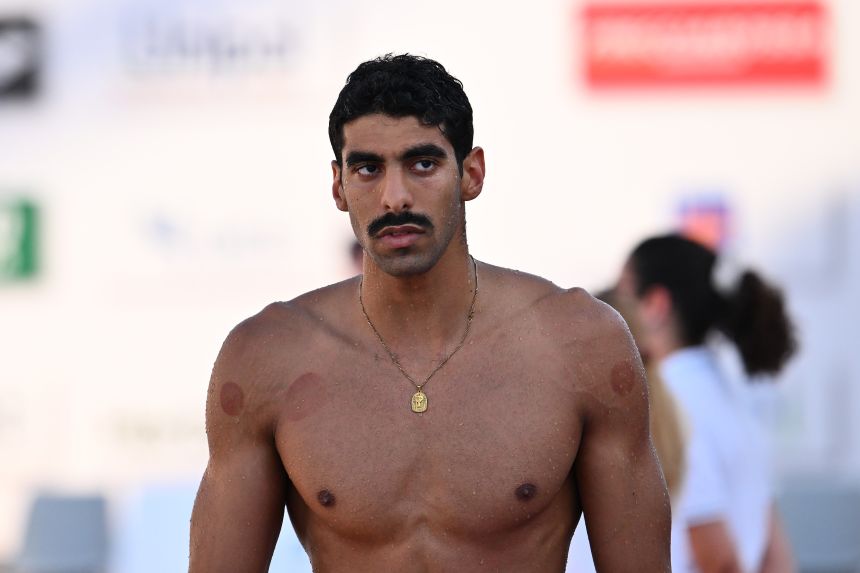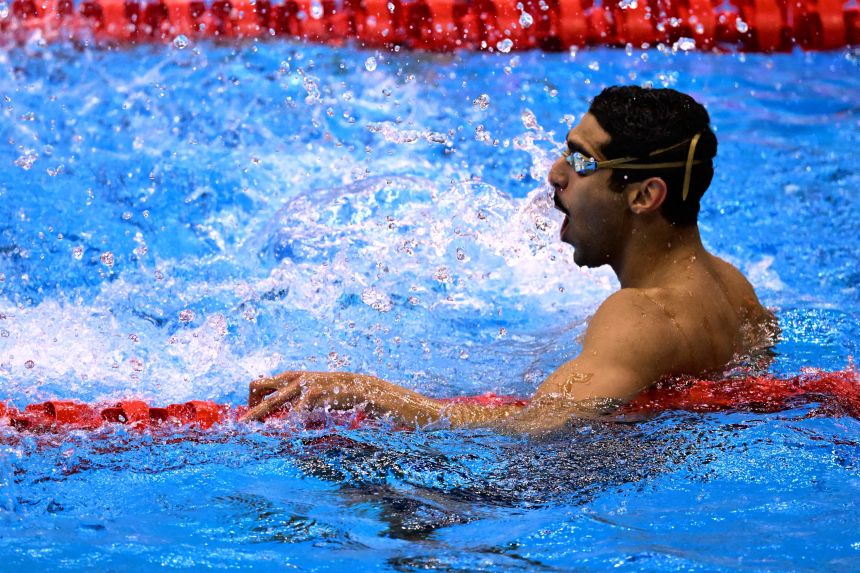EDITOR’S NOTE: Help is available if you or someone you know is struggling with suicidal thoughts or mental health matters. In the United States, call the National Suicide Prevention Lifeline at 1-800-273-8255. The International Association for Suicide Prevention and Befrienders Worldwide also can provide contact information for crisis centers around the world.
For all Abdelrahman Elaraby’s success as an athlete, swimming is a passion simultaneously pursued intensely and held at arm’s length.
“You’ll never find me talking about swimming outside the pool,” the 25-year-old Egyptian told CNN Sports.
Few people even knew that he had broken the African record in the men’s 50m butterfly in Monaco in May until the news was shared publicly. When one of his friends checked to make sure he was OK after not hearing from him for a few days, Elaraby simply responded, “‘Yeah man, I just … became the fastest African in history so I feel great.’
“And he was like … ‘How did you not tell anybody?’” Elaraby recalled.

For him, focusing on life outside swimming is just as important as his goals in the sport. There is time for training in the pool and at the gym, “and then outside that we can find some other stuff to do,” he added. “I’m very family-oriented … I read, I journal, I could go crazy if I leave my house without journaling in the morning or praying or reading the Quran.”
Still, even as the fifth fastest man in the world this year over his preferred distance – the 50m butterfly – Elaraby prefers not to think about swimming as a career, wary of the trap he fell into earlier in his life.
From ‘the slowest kid on the team’
It was Elaraby’s mom who first introduced him to swimming as a child in Cairo, searching for any way to tire out her young, chatty, social son who had been diagnosed with ADHD.
“So many people told her: ‘He’s the slowest kid on the team. What are you doing?’” Elaraby said. But she stuck with it and her son improved, drawn to the sport by the friends he found there.
In 2018, he became Egypt’s national champion in the 50m fly and won bronze in the 50m freestyle at the Junior Olympic Games.
Aged 18, he left Egypt on a scholarship for the University of Louisville (Kentucky), competing on the swim team. However, while at Louisville, in March 2022, he attempted to take his own life.

He had lost his passion for swimming and that spiralled into feelings of worthlessness, he said in a 2023 video made by the University of Louisville for Mental Health Awareness Month. He overdosed on medication and was taken to hospital, where he fell into a coma.
When Elaraby recovered, he was transferred to a “mental health hospital,” but even then, his thoughts were on returning to competitive swimming, he said in the video.
In the time since March 2022, Elaraby has spoken of “reclaiming” his life, of finding purpose and fulfillment again. Part of that has involved getting closer to his Muslim faith, he said. Another part has been by reducing the time he spends on his phone, instead using it to try things like learning a musical instrument and “reading more about topics in life,” like the philosophy of Stoicism.
And another is by considering: “Who do I allow in my life?”
“I’m the fastest person to block people now (on social media) … just being part of each other’s life is a great honor,” he told CNN Sports.
Although 2023 was tough and he considered quitting swimming, he threw himself into his training and won the Atlantic Coast Conference (ACC) title in the men’s 50m freestyle.

‘It took away from the love I have for the sport’
In 2023, he left Louisville and swam for the University of Notre Dame, but after graduating, he began working full-time at a non-profit that helps college athletes break into the world of work, giving himself something to focus on beside his training.
“I got so stuck on the idea that I need to win, not because I want to win, I need to win because, if I win, I’m going to make this amount of money; if I win, I’m going to get seen by this amount of investors or sponsors,” he said. “And it took away from the beauty and the love I have for the sport.”
Last year, he was “ready to quit” after failing to qualify for the Egyptian Olympic team. He didn’t have a coach. Notre Dame’s swim team was suspended for a year due to “possible misconduct” and gambling violations and Elaraby says he was not seen as a training priority; he had “every reason” to stop.
Only a passing comment made by an Egyptian entrepreneur while she was interviewing him persuaded Elaraby to continue swimming. “You should go back to swimming, but not because you want to achieve things, it’s because this is what you love,” he recalled her saying.

So he returned to the pool and trained three or four times a week. But without any serious weight training, he went to the World Championships last year in Budapest, Hungary, knowing he was “absolutely out of shape.”
There he finished joint 34th in the 50m butterfly and realized that “being here just for the fun of the sport is not what I wanted. It’s not fulfilling.”
Determined to become a world-class athlete again, Elaraby took it upon himself to buy books about coaching, learned how to coach himself and set up competitions at the end of every month to focus his training blocks.
That approach has paid off, allowing him to break that African 50m fly record and resurrect his goal of qualifying for the Olympics. In a moment of serendipity, Elaraby’s preferred 50m butterfly event, as well as the 50m breaststroke and backstroke, will be included at the 2028 Olympics for the first time in the Games’ history.
This news made Elaraby “so excited,” he said, adding that he believes competing at the Olympics in his preferred event would give him respect that he’s previously been denied.
But, even with such lofty goals, Elaraby’s life remains multifaceted, concentrated as much outside the pool as inside it.
After his suicide attempt, he shared his story in the hope of encouraging others, particularly men, to seek help when they need it. Opening up publicly initially provoked two types of reactions, he said.
“(Some) people were like, ‘Why are you talking about it? This is a very private matter. You should keep it to yourself’ … And then a lot of people were like ‘We feel seen, thank you, you’re so courageous,’” he said.
Speaking so publicly about his mental health and advocating for others to take better care of theirs comes with a complex responsibility. As time went on, Elaraby became wary of people taking his message and using it “to find an excuse not to do things.”
“I don’t want to drown a whole generation while I’m trying to save some people,” he said. “I don’t want to create a world of mentally weak individuals – I’m just trying to allow people to see mental health the right way, just as physical health. I’m not asking people to curl up and cry. I’m just asking people to get help, just like (when) you break an arm.”

